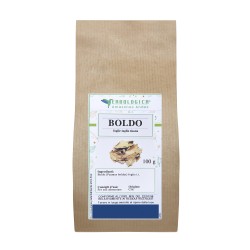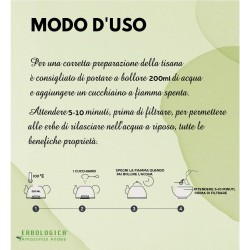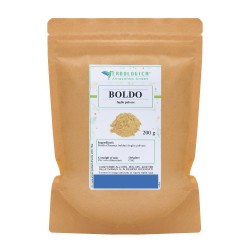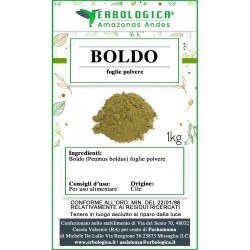
Boldo pianta e suoi benefici per l'organismo
Le capre andine che si nutrono delle foglie di boldo non soffrono mai di problemi al fegato, un fatto che rivela molto sulla potente relazione tra boldo e fegato.
Questa pianta, originaria dell'America Latina, viene utilizzata da oltre 13 mila anni nella medicina tradizionale per risolvere vari disturbi dell'organismo.
Infatti, il boldo è particolarmente apprezzato per le sue proprietà epatoprotettrici, stimolando la produzione di bile e aiutando a prevenire danni al fegato.
Inoltre, questa pianta offre numerosi benefici anche per il sistema digestivo, alleviando gonfiore addominale e problemi di digestione.
Tuttavia, è importante conoscere anche le controindicazioni del boldo, poiché l'uso prolungato non è raccomandato.
In questo articolo, esploreremo a cosa serve il boldo, le sue origini, i suoi potenti benefici e come possiamo utilizzarlo correttamente per migliorare la nostra salute.
Origine e caratteristiche botaniche del boldo
Il Peumus boldus (nome scientifico del boldo) è un arbusto sempreverde appartenente alla famiglia delle Monimiaceae.
Originariamente endemico del Cile centrale e meridionale, questo piccolo albero si è successivamente diffuso in diverse zone del Sudamerica ed è stato introdotto anche in Europa e nell'Africa del Nord.
Il boldo preferisce crescere su pendii asciutti e soleggiati, spesso in zone leggermente boscose.
Questa pianta si distingue per il suo portamento arrotondato e per la sua crescita relativamente lenta.
In base alle fonti scientifiche, può raggiungere un'altezza variabile tra i 3 e i 7 metri, sebbene generalmente non superi i 5 metri.
La corteccia del boldo presenta una colorazione grigia che tende a staccarsi in piccole placche arrotondate. I ramoscelli più giovani sono leggermente ricoperti da una fine peluria.
Le foglie, che rappresentano la parte più utilizzata in fitoterapia, sono persistenti, opposte, ovali e coriacee. La loro superficie superiore è rugosa al tatto e di colore verde scuro, mentre quella inferiore è più chiara, conferendo alla pianta un aspetto argentato.
Una caratteristica distintiva delle foglie di boldo è il loro forte odore aromatico, dovuto alla presenza di oli essenziali.
La pianta contiene numerosi composti attivi, principalmente concentrati nelle foglie essiccate che costituiscono la "droga" della pianta.
Il boldo è una specie dioica, ovvero presenta fiori maschili e femminili su piante separate.
I fiori, di colore bianco-giallo, sono raggruppati in piccole infiorescenze terminali composte da 5-12 elementi.
I frutti sono carnosi e commestibili, caratterizzati da un sapore dolce e aromatico e da un diametro che può raggiungere i 2 cm.
Dal punto di vista chimico, le foglie di boldo contengono alcaloidi isochinolinici (il principale è la boldina), flavonoidi (come l'isoramnetina) e un olio essenziale ricco di monoterpeni tra cui limonene, cineolo, ascaridolo e fellandrene.
Questi componenti conferiscono alla pianta le sue proprietà benefiche, particolarmente apprezzate per il supporto alla funzionalità epatica.
Boldo: proprietà e benefici per l’organismo
I principali benefici del boldo sono legati alle sue potenti proprietà epatoprotettive.
Questa pianta aiuta infatti a stimolare la funzionalità epatica e favorisce la produzione di bile, rendendola particolarmente utile per chi soffre di problemi al fegato o alla cistifellea.
Tra i composti attivi più importanti del boldo troviamo la boldina, un alcaloide con proprietà antiossidanti che protegge il fegato dai danni dei radicali liberi.
La boldina stimola la secrezione biliare e favorisce l'eliminazione delle tossine, agendo come un vero e proprio depurativo naturale per l'organismo.
Un altro beneficio significativo del boldo riguarda l'apparato digerente.
Grazie alle sue proprietà carminative, questa pianta allevia efficacemente il gonfiore addominale e contrasta la formazione di gas intestinali.
Certamente, il boldo si rivela prezioso anche per chi soffre di digestione lenta o pesantezza dopo i pasti, poiché stimola la produzione di succhi gastrici e facilita il processo digestivo.
Le proprietà del boldo non si limitano al sistema epatobiliare e digestivo. In particolare, questa pianta possiede anche:
- Azione antinfiammatoria, utile per ridurre le infiammazioni dell'apparato digerente
- Effetto diuretico leggero, che favorisce l'eliminazione dei liquidi in eccesso
- Proprietà antimicrobiche, efficaci contro alcuni batteri e parassiti intestinali
Il boldo è tradizionalmente impiegato anche per alleviare la stitichezza occasionale, grazie alla sua capacità di stimolare la motilità intestinale.
Oltretutto, gli studi moderni hanno confermato le sue proprietà ipocolesterolemizzanti, che contribuiscono a mantenere i livelli di colesterolo nella norma.
Nonostante i numerosi benefici, è importante ricordare che il boldo presenta alcune controindicazioni.
Generalmente, non è consigliato l'uso prolungato di questa pianta e va evitato in gravidanza, durante l'allattamento e in caso di patologie epatiche gravi.
Prima di utilizzare il boldo per scopi terapeutici, quindi, è sempre consigliabile consultare un medico o un esperto in fitoterapia.
Come si assume il boldo e in quali forme
Il boldo può essere assunto in diverse forme, ciascuna con specifiche modalità di preparazione e dosaggio.
Innanzitutto, la forma più comune e tradizionale è l'infuso o tisana, preparata con le foglie essiccate della pianta.
Per preparare un infuso di boldo, si consiglia di utilizzare 1-2 grammi di foglie essiccate in una tazza di acqua calda (circa 200 ml).
È sufficiente versare l'acqua bollente sulle foglie e lasciare in infusione per 5-10 minuti.
Questa bevanda, caratterizzata da un gusto leggermente amaro e aromatico, risulta particolarmente efficace se consumata dopo i pasti per favorire la digestione.
Si possono bere da 1 a 3 tazze al giorno.
Il boldo è disponibile anche sotto forma di integratori:
Capsule ed estratti secchi: il dosaggio varia tra 200 e 400 mg di estratto al giorno.
Generalmente si consiglia l'assunzione di una quantità di prodotto pari a 1 mg di boldina, dalle due alle tre volte al giorno.
Alcuni prodotti raccomandano 2-4 capsule quotidiane, preferibilmente la sera prima di coricarsi.
Tintura madre: si assumono circa 20-30 gocce diluite in un bicchiere d'acqua, 2-3 volte al giorno.
La posologia massima giornaliera consigliata è di 120 gocce.
Estratto liquido: la dose consigliata è di 0,5-1 ml al giorno.
È fondamentale rispettare la durata del trattamento: il boldo non dovrebbe essere utilizzato in modo continuativo per più di 2-3 settimane.
Dopo un ciclo di trattamento, è consigliabile fare una pausa di almeno una settimana prima di riprendere l'utilizzo.
Per ridurre al minimo gli effetti collaterali, è importante limitare l'assunzione di tè di boldo a una sola tazza (240 ml) al bisogno.
Alcune persone mescolano il boldo con yerba mate per migliorarne il sapore.
Il boldo contiene boldina e ascaridolo, che possono diventare tossici se assunti in dosi elevate o per lunghi periodi.
Consigliabile consultare un medico prima di utilizzare il boldo per scopi terapeutici, soprattutto se si prevede di usarlo per più di 2-3 settimane o se si stanno assumendo farmaci.
Analisi finale
Il boldo si conferma quindi una pianta dalle notevoli proprietà benefiche, specialmente per la salute del fegato e dell'apparato digerente.
I suoi principi attivi, primo fra tutti la boldina, offrono un supporto naturale alle funzioni epatiche e digestive.
Durante i secoli, questa pianta sudamericana ha dimostrato la sua efficacia nella medicina tradizionale, efficacia successivamente confermata da studi scientifici moderni.
Possiamo assumere il boldo in diverse forme, dalla classica tisana agli estratti secchi in capsule, fino alla tintura madre.
Ciascuna preparazione presenta dosaggi specifici che dovremmo rispettare scrupolosamente.
Certamente, l'aspetto più importante da considerare rimane la durata del trattamento, che non dovrebbe mai superare le 2-3 settimane consecutive.
Nonostante i numerosi benefici, dobbiamo ricordare le controindicazioni del boldo, evitandone l'uso in gravidanza, durante l'allattamento o in caso di patologie epatiche gravi.
Prima di iniziare qualsiasi trattamento a base di boldo, è fondamentale consultare un medico o un esperto in fitoterapia.
Il mondo delle piante medicinali ci offre soluzioni preziose per il nostro benessere, a patto che le utilizziamo con consapevolezza e rispetto.
Il boldo rappresenta uno degli esempi più significativi di come la natura possa supportare la nostra salute, specialmente quando affrontiamo problemi digestivi o epatici.
Attraverso un uso corretto e consapevole, possiamo beneficiare delle straordinarie proprietà di questa pianta millenaria senza incorrere in effetti indesiderati.
FAQs
Q1. Quali sono i principali benefici del boldo per la salute?
Il boldo offre numerosi benefici, principalmente per il fegato e l'apparato digerente.
Stimola la funzionalità epatica, favorisce la produzione di bile, protegge il fegato dai danni dei radicali liberi e aiuta nella digestione, ha proprietà antinfiammatorie, diuretiche e antimicrobiche.
Q2. Come si può assumere il boldo e in quali dosaggi?
Il boldo può essere assunto in diverse forme: come infuso (1-2 grammi di foglie in una tazza d'acqua), in capsule (200-400 mg di estratto al giorno),
come tintura madre (20-30 gocce 2-3 volte al giorno) o come estratto liquido (0,5-1 ml al giorno).
È importante non superare i dosaggi consigliati e limitare l'uso a 2-3 settimane consecutive.
Q3. Ci sono controindicazioni nell'uso del boldo?
Sì, il boldo presenta alcune controindicazioni.
Non è raccomandato l'uso prolungato e va evitato in gravidanza, durante l'allattamento e in caso di patologie epatiche gravi.
Può interferire con alcuni farmaci e causare effetti collaterali se assunto in dosi elevate.
Q4. Quali sono i principi attivi più importanti del boldo?
I principali principi attivi del boldo sono la boldina (un alcaloide con proprietà antiossidanti), flavonoidi e oli essenziali.
Questi composti sono responsabili delle proprietà epatoprotettive, digestive e depurative della pianta.
Q5. Il boldo può aiutare con problemi di digestione?
Sì, il boldo è particolarmente efficace per i problemi digestivi.
Grazie alle sue proprietà carminative, allevia il gonfiore addominale e contrasta la formazione di gas intestinali.
Stimola la produzione di succhi gastrici, facilitando la digestione e aiutando chi soffre di digestione lenta o pesantezza dopo i pasti.





